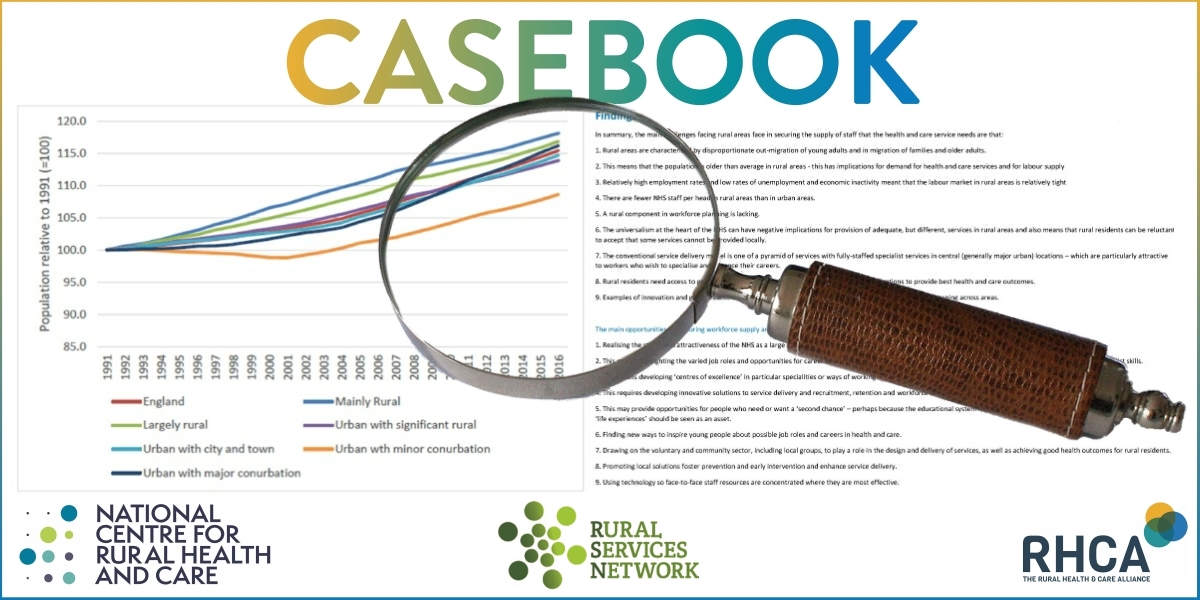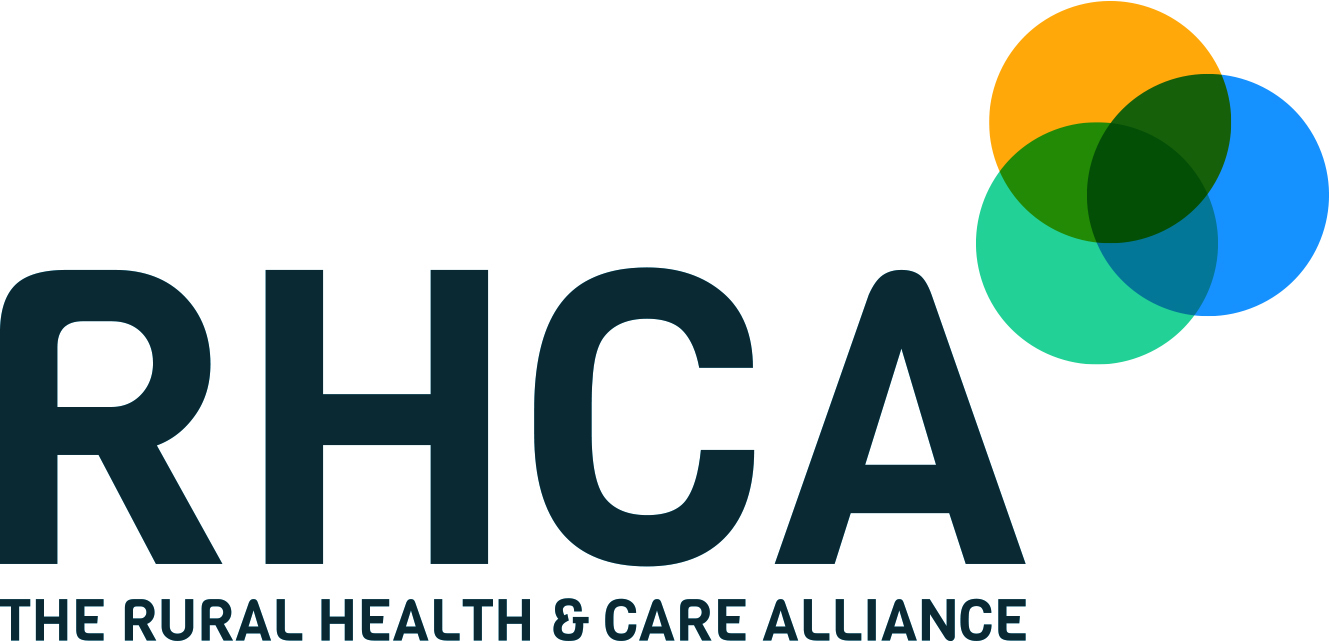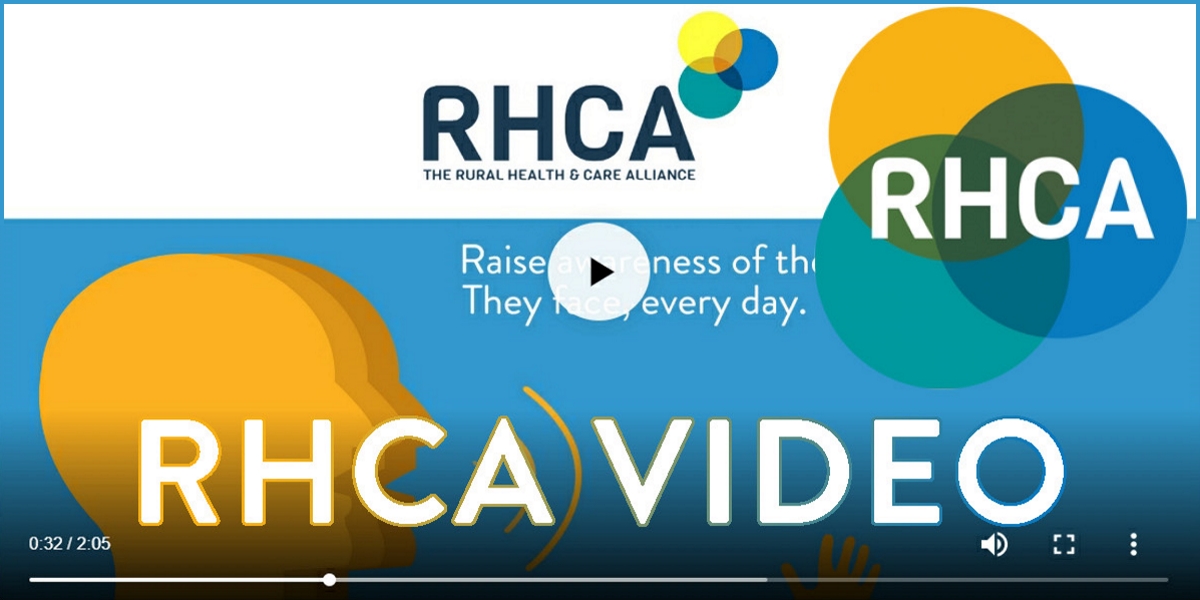T: 01822 851370 E: [email protected]
Visit RSN Survey about life in rural England to find out more.
September Edition of Casebook from the Rural Health and Care Alliance
 September 2024 Edition
September 2024 Edition
In this edition of Casebook, we feature Lord Darzi’s Independent Investigation of the NHS in England, which sheds light on the current challenges facing our healthcare system, including rising pressures and longer waiting times. We also reflect on the Prime Minister’s recent speech outlining priorities for NHS reform, emphasising the need for workforce retention and improved mental health services. We also highlight ongoing parliamentary discussions addressing the rural pharmacy crisis and its implications for accessibility in remote areas. Read on to explore these critical topics and more!

Lord Darzi’s Independent Investigation of the NHS in England
Published last week, Lord Darzi’s Independent Investigation of the NHS in England offers a comprehensive assessment of the current state of the NHS, pointing to increased pressures on healthcare services, longer waiting times, and limited progress in early-stage cancer diagnoses. While this report provides a broad overview of national health challenges, there is no specific focus on rural healthcare. Instead, it focuses on the system as a whole, calling for significant investment in public health to reduce strain on hospitals and improve overall health outcomes.
One key recommendation is the creation of a "neighbourhood NHS" model, which would integrate primary, community, and mental health services into a multidisciplinary approach. While not targeted specifically at rural areas, this model could be highly beneficial in regions where access to healthcare is more limited. Bringing services closer to communities—whether urban or rural—has the potential to improve healthcare delivery for everyone, particularly in areas where distance and travel time are significant barriers.
Although the report does not address rural health directly, the proposed focus on public health, preventative care, and community-based services could significantly impact rural populations. Strengthening these areas would help reduce hospital admissions and improve health outcomes, especially in isolated regions.
The RSN and the National Centre for Rural Health and Care are reviewing the report in detail and will provide a formal response in due course.

Responding to the publication of Professor Lord Darzi’s Independent Investigation of the National Health Service in England, Nuffield Trust Chief Executive Thea Stein said:
Lord Darzi’s damning report underlines the stark realities experienced across almost every corner of the health service. Wide-ranging problems have been growing in plain sight for years and Darzi’s impressively comprehensive assessment will be familiar to anyone who has studied or experienced the slow deterioration of health care provision in England.
While not surprising, the report’s findings are deeply troubling. As our research work has repeatedly shown, too often the NHS is not able to provide people with the timely care they need, despite steadfast public commitment to the core principles of the health service. The impacts of this are not felt equally: people in the poorest areas are particularly struggling to access healthcare.
The big question now is what happens next.
The Government has an early opportunity to make good on long-argued points on dysfunctional NHS funding in its first Budget next month. The health service is staring down the barrel of a significant shortfall in funding this current year and the Chancellor will need to set out clear plans to tackle this, ahead of a longer-term funding settlement.
Rightly, the report repeatedly references the interrelated, compounding pressures of the desperate state of social care and cuts to public health provision. But by design it does not dig into those issues. In future, we hope to see serious work by the government to address those broader societal issues that determine population health and impact health care access.
Ultimately, the Lord Darzi’s diagnostic report sets out important aspirations to be delivered in the forthcoming 10-year plan to treat – and fix – the NHS. But the improvements we all hope for – and that patients desperately need – will take time, commitment and major financial, practical and system-wide support. There will be no quick fixes.
Prime Minister’s Speech on the NHS
In a speech on 12th September, the Prime Minister discussed the government’s priorities for NHS reform, including addressing staff shortages, reducing waiting times, and improving mental health services. While the speech outlined a broad vision for the future of healthcare, there was again no specific reference to rural health issues. However, the proposed initiatives, such as expanding access to healthcare services through technology and focusing on preventative care, could have important implications for rural areas.
For rural communities, where accessing healthcare services can be more difficult due to geographic barriers, efforts to improve telemedicine, digital health platforms, and mobile healthcare units could help bridge gaps. These initiatives would make it easier for rural residents to receive care without the need for extensive travel, which is often a challenge in these areas.
The integration of mental health services into primary care is another proposed reform that could benefit rural populations. Mental health services are often less accessible in rural regions, and this approach may help reduce stigma and make it easier for individuals to seek support closer to home.
Read more about the PM’s vision for the NHS:
https://www.gov.uk/government/speeches/pm-speech-on-the-nhs-12-september-2024

Update on Adult Social Care Charging Reforms
The government has confirmed that the planned adult social care charging reforms, initially outlined in the previous administration’s policy paper “Build Back Better: Our Plan for Health and Social Care,” will not be implemented in October 2025 as previously scheduled. These reforms, inherited from the former government, aimed to address long-term challenges in funding and access to adult social care.
For more details, read the Chancellor’s statement on public spending inheritance: https://www.gov.uk/government/speeches/chancellor-statement-on-public-spending-inheritance
Parliament Debates Urgent Solutions for Rural Pharmacy Crisis
Earlier this month, we featured an article in the Rural Bulletin highlighting the Risk of Rural Pharmacy Deserts Threatening Medicine Supplies. Last week, parliamentary debate continued the focus on rural pharmacy challenges, emphasising the need to address accessibility in these communities.
The debate in the House of Lords brought to light critical concerns regarding access to pharmacies in rural areas, underscoring the unique challenges faced by these communities. The discussion, initiated by The Lord Bishop of St Albans, raised pressing issues such as the £1.2 billion funding gap identified by the Independent Pharmacies Association and the declining number of community pharmacies, particularly in rural and deprived regions.
Baroness Merron, the Parliamentary Under-Secretary of State for Health and Social Care, acknowledged the growing concerns and emphasised the government's commitment to expanding the role of pharmacies as central hubs for healthcare delivery. However, she admitted that past funding cuts had significantly affected community pharmacies, particularly in rural settings where the closure of services disproportionately impacts local residents.
One of the key issues discussed was the disparity between urban and rural areas regarding pharmacy services. Baroness McIntosh of Pickering highlighted the critical role that dispensing doctors play in rural communities, serving as an alternative when traditional pharmacies are not viable. Despite the increasing reliance on online pharmacies and dispensing doctors, there remains a gap in services that require in-person interactions, such as vaccinations and consultations for chronic conditions.
The debate also touched on creative solutions to address the rural healthcare gap. The Earl of Devon proposed that the government review the rural retail supply chain, as the loss of wholesale supplies further exacerbates the challenges faced by rural pharmacies. Additionally, Lord Swire suggested locating pharmacies within community or cottage hospitals, which has proven successful in some areas and could be expanded to benefit more rural communities.
Another significant concern raised was the potential closure of one in six community pharmacies within the next year, as mentioned by Lord Scriven. While financial support through schemes like the Pharmacy Access Scheme exists, more targeted action is needed to prevent further closures, particularly in areas where pharmacies are sparse.
Rural residents often rely on limited public transport, making access to healthcare even more challenging. Lord Foulkes pointed to the deterioration of rural bus services as a contributing factor to reduced access to pharmacies. He emphasised the importance of improving local transport links to help residents reach essential services more easily. Baroness Merron supported this, noting the importance of creative solutions like distance-selling pharmacies, which deliver medicines free of charge to patients in remote areas.
The government's Pharmacy First initiative, which allows patients to access treatment for common conditions without the need for a GP appointment, also came under discussion. While this initiative has helped alleviate some of the pressure on GPs, it is essential to ensure that rural residents benefit from it equally. Baroness Merron reassured the House that pilot programs across the country, including rural areas, are underway to explore how pharmacies can take on an expanded role in healthcare delivery.
Read the debate transcript in full HERE.

Lincolnshire NHS Team Achieves Re-Certification for Violence Prevention Training Standards
The Prevention and Management of Violence and Aggression (PMVA) Team at Lincolnshire Partnership NHS Foundation Trust has successfully achieved re-certification by the Bild Association of Certified Training as complying with the Restraint Reduction Network Training Standards.
The certification is valid for the next three years and in the meantime, the team will continue to develop the service in order to ensure best practice.
The British Institute of Learning Disabilities (BILD) are an independent UKAS accredited certification body licensed to certify training which meets Restraint Reduction Network (RRN) training standards. The Mental Health Units (Use of Force) Act Statutory Guidance mandates that training providers must be certified as complying with the RRN Training standards and in addition, the CQC expect regulated services such as LPFT to use certified training.
The RRN Training Standards are designed to:
- Protect people’s fundamental human rights and promote person centred best interest and therapeutic approaches to supporting people when they are distressed.
- Improve the quality of life of those being restrained and those supporting them.
- Reduce reliance on restrictive practices by promoting positive culture and practice that focuses on prevention, de-escalation and reflective practice.
- Increase the understanding of the root causes of behaviour and recognition that many behaviours are the result of distress due to unmet needs.
Where required, focus on the safest and most dignified use of restrictive interventions including physical restraint. The scheme includes training needs analysis to ensure training is proportional to the needs of the population and setting. There is also increased scrutiny of curricula, senior trainers and affiliated organisations.
Highlights from the National Rural Conference, Rural Health and Care Session
Global Lessons, Local Impact: Tackling Rural Health Inequalities
 Donna Chapman from NHS Cornwall and the Isles of Scilly, and Dr. Matt Harris from Imperial College London presented innovative strategies aimed at tackling health inequalities in rural communities. Their joint presentation focused on learning from Brazil’s Family Health Strategy and applying these lessons to the UK, specifically Cornwall and the Isles of Scilly.
Donna Chapman from NHS Cornwall and the Isles of Scilly, and Dr. Matt Harris from Imperial College London presented innovative strategies aimed at tackling health inequalities in rural communities. Their joint presentation focused on learning from Brazil’s Family Health Strategy and applying these lessons to the UK, specifically Cornwall and the Isles of Scilly.
The Brazilian model involves community health workers (CHWWs) conducting proactive, local outreach, with workers engaging up to 150 households each to provide early help and prevention. This model is notable for its integration within primary care teams and its success in covering 75% of Brazil's population. Dr. Harris highlighted the relevance of this approach to current UK challenges, including widening health inequalities, workforce shortages, and the under-addressed social determinants of health. Despite scepticism about learning from developing countries, this model could offer a more cohesive, community-driven approach to healthcare in the UK.
This model has already been adapted in Cornwall and the Isles of Scilly. Donna Chapman illustrated the region's challenges, particularly in highly deprived areas, and introduced a hands-on initiative that focuses on “proportionate universality” - a comprehensive and intergenerational approach that is integrated and hyper-local. Community Health and Wellbeing Workers (CHWWs) in Cornwall are allocated around 120 households each, fostering long-term, trusted relationships with regular monthly contact. This approach is currently active across nine areas, with an emphasis on supporting people in deprived areas, improving well-being, and addressing issues such as finance, housing, and mental health.
The discussion showcased early successes, including improved well-being scores and strong community engagement. It also pointed to future developments, including plans to expand the CHWW initiative to other parts of the UK through a national scaling project. This collaboration has already received national attention, with nominations for various awards, and reflects a bold effort to address rural health inequalities by building on global health strategies.
Bridging Health Gaps in Rural and Coastal Communities
Professor Mark Gussy from the University of Lincoln presented an insightful overview of the challenges and opportunities facing rural and coastal health through the work of the Lincoln Institute for Rural and Coastal Health (LIRCH). His presentation underscored the pressing health disparities in coastal communities, where higher disease burdens, mental health challenges, and elevated deprivation levels are more prevalent.
He highlighted critical factors such as the demographic pressures of aging populations, limited access to health services, and socioeconomic challenges like poor education and housing. Drawing from the 2021 Chief Medical Officer's report, he emphasised the urgent need for national action, arguing that improving health in coastal areas would benefit the health of the entire nation.
LIRCH's research focuses on four key themes: community-led health and social care design, equitable access to rural and coastal services, the impacts of climate change on health, and innovative place-based systems design. Professor Gussy also discussed geospatial and epidemiological research and showed visual data on food access and fast-food proximity in rural Lincolnshire, illustrating the complex interaction between geography and health outcomes.
Professor Gussy advocated for collaborative research to understand rural health challenges fully, paving the way for a more inclusive and equitable healthcare system for rural and coastal populations.
Addressing Mental, Physical, and Financial Challenges in Farming and Rural Communities
Caron Whaley, the Director of Services at the Royal Agricultural Benevolent Institution (RABI), delivered a compelling presentation during the Rural Health and Care session, focusing on the wellbeing of the farming community.
RABI, a charity supporting farmers across England, Wales, and Northern Ireland, has been a vital source of practical, financial, and emotional assistance for over 25 years, distributing nearly £250 million. Caron highlighted the unique challenges faced by the farming community, emphasising the interconnectedness of mental, physical, and financial wellbeing, as revealed by the charity's Big Farming Survey, which garnered 15,500 responses.
Key findings from the survey demonstrated that farmers' health and wellbeing are deeply impacted by rural isolation, economic pressures, and the physical demands of farming life. To address these challenges, RABI has implemented various practical initiatives, including an online wellbeing platform, professional counselling services, and accredited mental health awareness training.
Caron outlined the next steps for RABI, which include collaborating with the government to support mental health services in rural communities, addressing rural poverty, and continuing to work with partners to improve access to healthcare. Additionally, RABI plans to engage policymakers through initiatives such as the upcoming RABI Summit, aiming to influence and shape policies to enhance the health and wellbeing of the rural population.
This presentation pointed out the importance of holistic, community-based solutions and underscored the ongoing need for governmental and third-sector collaboration to tackle the complex health challenges faced by rural communities.
We’d love to hear from you - share what you’re proud of
If you have something, you would like us to feature in a future edition, please let us know by clicking here to send us an email.
Spread the word
If you know of other organisations that you think would benefit from joining the Rural Health & Care Alliance, please click here to email us and let us know.
RURAL SERVICES NETWORK
Up to date news on Health and Care
The Rural Services Network provides a useful source of themed news content and data. Check out the latest news on Health & Wellbeing and Vulnerability, where you’ll find articles on a diverse range of rural issues affecting rural communities. You might also find this research on Over 65 Population Projections useful too.
Latest from RSN Member Insights
RSN Member Insights is the place to discover the statistics that define communities within our membership. It is regularly updated with new analyses, and these will be highlighted in the 'What's New' section of the RSN's Weekly Rural Bulletin. The Rural Bulletin also provides a selection of the most rurally topical news items, so do subscribe and encourage your colleagues to subscribe to what is an invaluable weekly periodical.
To make a suggestion of data that would benefit you by being included in the Member Insights section, please email Dan Worth, our Research and Performance Analyst, at [email protected].
| The Rural Health & Care Alliance is a membership organisation administered by the Rural Services Network on behalf of the National Centre for Rural Health & Care. Explore the RHCA service below: |
 |
 |
 |
 |
 |
 |
 |
 |
 |
 |






